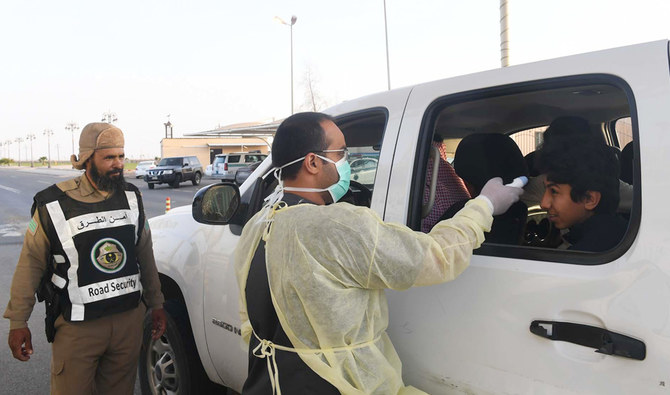JEDDAH: Saudi authorities have implemented a wide range of precautionary measures to limit the spread of the coronavirus disease (COVID-19). However, their effectiveness will be reduced if the public fails to follow social-distancing rules or listen to advice on how to protect themselves and their communities, experts warn.
Dr. Ezzuddin Okmi, health executive expert and preventive medicine and public health specialist at the Saudi Center for Disease Prevention and Control, said that infection rates are hard to predict but the disease will spread more quickly to a greater number of people if Ministry of Health advice is ignored.
On Sunday, King Salman issued an order imposing a Kingdom-wide curfew from 7 p.m. to 6 a.m. for 21 days, with the threat of fines and jail time for anyone who violates it. Only security, emergency and health services are exempt, along with deliveries of food, medical supplies and other essential goods.
Restrictions have also been placed on people’s movement outside of those hours, and most shops have been ordered to close, other than those selling vital supplies, such as food and medicine. Flights in and out of the country were previously grounded and all patients who test positive for the disease are immediately isolated.
“As we know that prevention is better than cure, these precautionary measures — such as suspension of flights and isolation of suspected and confirmed cases (of the virus) — will have a greater impact on shutting down the transmission cycle of the virus and preventing it from spreading in the community,” said Okmi.
“By keeping healthy individuals away from the risk factors that lead to an outbreak, the rate of new cases will be kept at a low level until no more new cases are detected.”
On Monday, the Ministry of Health announced 205 new confirmed cases, and the death of an Afghan resident as a result of the virus. Although the numbers are still rising, experts consider it to be a steady increase and believe the precautionary measures will “flatten the curve” of the virus. This means slowing the rate of infection so that fewer people need urgent treatment at any given time, which helps the health services cope with demand.
“Based on the situations in many countries that have not taken the COVID-19 outbreak seriously, such as Italy, you can expect a faster rate of spread (in these countries) with a very high number of infections,” said Okmi.
“There are many factors that influence the number of cases affected by COVID-19, hence we cannot predict the exact number of cases as we still can’t precisely detect numbers such as the secondary infection rate.”
Research has shown that the faster the authorities move to implement social-distancing measures to slow the spread of a disease, the more lives are saved. COVID-19 is a new disease and many of its mysteries are yet to be solved. The epidemiological characteristics of the outbreak — in other words, how it develops, spreads and can be controlled — are still not fully understood, with its effects differing between countries.
BACKGROUND
• On Sunday, King Salman issued an order imposing a Kingdom-wide curfew from 7 p.m. to 6 a.m. for 21 days.
• Restrictions have also been placed on people’s movement outside of those hours, and most shops have been ordered to close, other than those selling vital supplies, such as food and medicine.
• Flights in and out of the country were previously grounded and all patients who test positive for the disease are immediately isolated.
The number of people likely to become infected with the coronavirus over a period of time cannot be accurately predicted. It is thought to have a five-day incubation period, according to a study of patients infected with the severe acute respiratory syndrome coronavirus 2 (SARS-CoV-2) — the virus that causes the COVID-19 disease — published on Mar. 10 in the American College of Physicians’s Annals of Internal Medicine.
After the incubation period, mild symptoms often appear that can be mistaken for a cold. The virus remains highly infectious for 10 to 14 days.
“We can only estimate the number of deaths in the community if people violate the rules of isolation and precaution policies,” said Okmi. “Furthermore, the disease’s severity is affected by many factors, such as age.”
“However, we have created a preparedness plan in case of an emergency. We created this plan to prepare for any dangers that will happen in the future, based on the situations in some countries.”
These preparations include: simulation exercises; training for health workers; the provision of adequate diagnostic facilities, including the establishment of drive-through testing stations; ensuring adequate supplies of medications are available and can be maintained; increasing the capacity of isolation facilities; setting up mechanisms for rapid communication with community and government sectors; and providing adequate support for hospitals.
“This plan is based on previous experiences in dealing with health emergencies,” said Okmi. “In 2019, a preparedness plan was created to respond to any influenza outbreaks, and we have successfully kept influenza cases at a controlled level.”
The message is clear: restrictions on the movement of people and gatherings, though dramatic, will help flatten the curve of new infections, slow the spread and, ultimately, save lives. Support for these measures from Saudi citizens and residents is critical to their success, along with swift action on testing and contact tracing.
Health officials continue to call on the public to adhere to the precautionary measures, be socially responsible, implement social distancing and “stay in place” until the pandemic is under control.





























